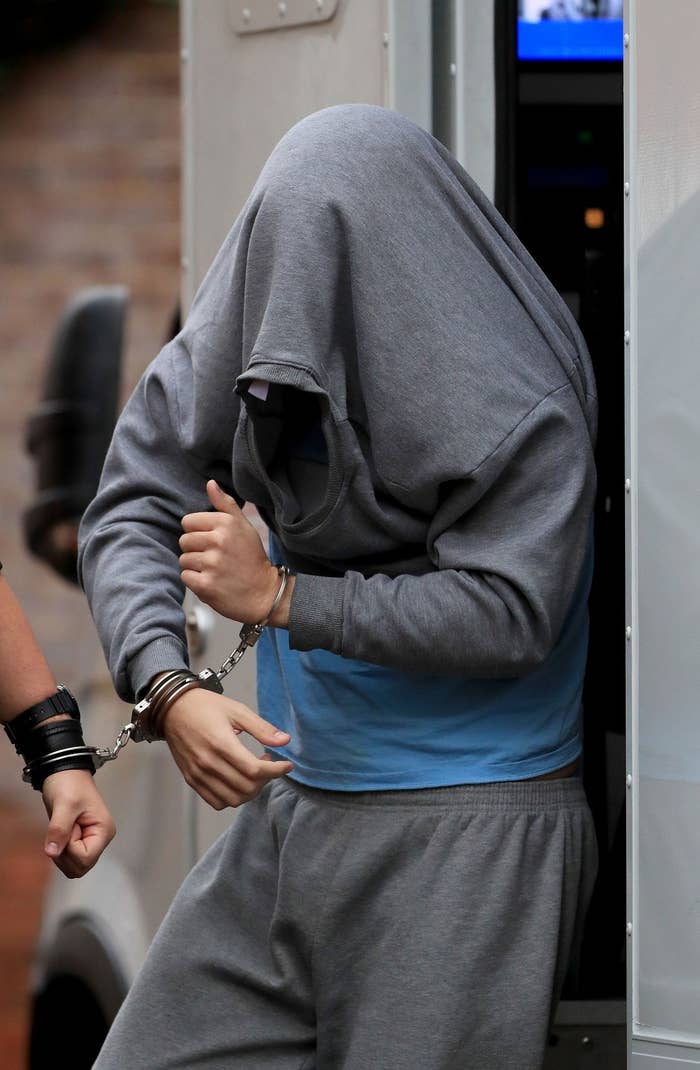
There were 10 victims. Half contracted the virus. Half did not. But Daryll Rowe intended to infect all of them.
On Wednesday, six months after being found guilty of five counts of causing grievous bodily harm with intent and another five of attempted GBH with intent, Rowe, 27, was sentenced to life in prison, with a minimum term of 12 years.
Given the time he has already spent on remand, that means he will have to serve a minimum of 10 years and 253 days from now before being eligible for parole.
Shortly after the sentence, one of Rowe's victims – the youngest of the 10 men who gave evidence against him – spoke to BuzzFeed News.
"I'm overwhelmed knowing he's in jail. I'm just so glad that I can finally put all of this behind me," he said. As one of the five men who did not contract the virus, he added, "Maybe the people who weren't as lucky as me can move on knowing he's got what he's deserved."
Handing down her sentence at Brighton magistrates’ court, Judge Christine Henson QC told Rowe that he posed a "significant risk to the public" and she could not see how or when he would no longer do so.
The judge told Rowe he had embarked upon a "deliberate campaign" to infect other men with HIV and was the first person in England to be sentenced for this offence.
Her sentencing remarks were extensive and damning, detailing his crimes, his pattern of behaviour, and his repeated attempts to escape detection and justice.
"You deceived all of the men into thinking you were HIV-negative," she said. When he did use a condom, he "deliberately sabotaged it". Furthermore, she added, "You sent many abusive and mocking messages. You knew exactly what you were doing."
Henson quoted some of the assessments conducted by psychiatrists examining Rowe.
"Dr Saoud noted in his report ... that your offending is associated with a ‘significant degree of rage, control, sadism and violence that requires further exploration’... She describes your behaviour during the commission of these offences as highly predatory, controlling, and manipulative. She assesses your risk of serious harm to gay men as high and a risk that is considered imminent."
One psychiatrist, said the judge, believed there was sufficient indication of "borderline personality disorder", which is characterised by extreme and sometimes swift mood changes. Another did not believe there was enough evidence to confirm that Rowe has a personality disorder.
However, said Henson, "Both consultant forensic psychiatrists agree that the seriousness of your case is directly linked into deceiving men into high-risk anal intercourse when you had not taken antiretroviral medication... Both agree that your motivation behind your offending is complex, particularly given your denial and rationalisation of your offending."
Given the complexity of the case, its unique characteristics, and the international attention it will provoke, the judge in summing up her remarks made clear that "this sentencing exercise is not about stigmatising those with an HIV diagnosis, nor should it detract from that medical progress that has been made since the 1980s regarding the treatment of those with HIV."
In conclusion, she said: "I have reminded myself of recent authorities regarding discretionary life sentences, which remains a sentence of last resort reserved for offending of the utmost gravity – this is such a case. The sentence I impose therefore is a sentence of life imprisonment."
Ahead of sentencing, the court heard from Rowe's victims in a series of impact statements revealing how his actions had affected them. One spoke of now often contemplating suicide. Another man said he suffers regular panic attacks.
"When I told myself and those closest to me that I was gay it was the most terrifying and liberating experience of my life," said another victim in his impact statement. "But having my vulnerability used against me will stay with me forever." He added: "I never thought I'd be someone to think about suicide," but said following his experiences with Rowe that is exactly what he contemplated.
Rowe, dressed in a grey suit, remained impassive throughout. His expression was blank. It remained so through all the victim statements. One said that what Rowe had done to him had had a "shattering effect" on his life. "I felt like a walking, talking disease. I lost my place in this world. I fell into a very dark place."
The oldest of his victims, who is in his forties, said in his victim statement how much he worries about the impact of the virus in his later life and the limiting effect the diagnosis has on one's ability to travel and work in certain countries. Compounding everything, his statement said, was that "Mr Rowe has never shown any sympathy or compassion. He has shown only arrogance, selfishness, and an utter lack of humanity."

Many of the victims said they had needed therapy. One had been admitted to a residential mental health centre.
Judge Henson said the victims had described "living with a life sentence".
The Daryll Rowe case was unique in legal history. Never before in English law had anyone been found guilty of intending to infect others with HIV – only doing so recklessly. But never before had the police had such a vast trove of evidence necessary to prove intent. That evidence was hundreds of messages that Rowe had sent and exchanged with the men he met through messaging and hookup apps like WhatsApp and Grindr.
During the trial in October and November 2017, through the testimony of witnesses and the messages that were read out, the court heard repeated abusive comments so multitudinous as to both form a clear pattern of behaviour and express clearly Rowe's intention: to infect the men he had sex with.
One of the men who testified, and who had previously given an exclusive interview to BuzzFeed News, told how Rowe said to him following sex, which he believed had been protected, that in fact it was not. "Haha I hope you enjoyed my cum inside you," Rowe told him, before describing his method: "I ripped the condom so burn."
To another man, the court heard, Rowe said: "I have HIV LOL. Oops!" followed by, "I'm riddled." With his youngest victim he exchanged hundreds of messages toying with him, admitting he had put him at risk, and then denying it. The prosecution read many of these messages aloud in one of the most dramatic scenes in court.
Some of the men Rowe told he was using a condom when he wasn't, or he removed it during sex. With others, he wore a condom that he had tampered with. When police arrested him for the final time – after he had absconded – they found several condoms with the tips cut off.
Deborah Gold, chief executive of the National AIDS Trust, said: "This is an exceptional case – the only ever prosecution in the UK of intentional transmission of HIV. Such intentional transmission is serious and deplorable, but this one-off case must be seen in context.
"People living with HIV are at the forefront of campaigns and work to prevent HIV, and the vast majority are on treatment and therefore cannot pass HIV on. It is vital that this case is not used as an excuse to add to the unacceptable stigma that people living with HIV experience."
The court also heard that Rowe refused to take HIV medication. Antiretrovirals when adhered to properly make it impossible to pass the virus on. But shortly after being diagnosed, Rowe had become what some refer to as an "AIDS denialist", refusing to believe HIV causes AIDS and that the treatment, which has been proven by millions to work, is a fabricated conspiracy by the pharmaceutical industry.
Instead, Rowe drank his own urine, believing this would cure his HIV. It did not.
